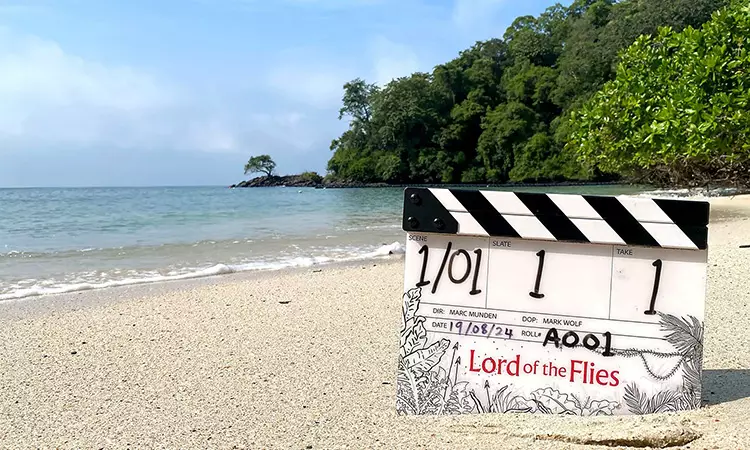The impending BBC adaptation of William Golding’s seminal novel *Lord of the Flies*, helmed by acclaimed writer Jack Thorne and director Marc Munden, presents an exciting opportunity to revisit a classic narrative that has shaped discussions around human nature and societal structure. This adaptation stands out as it aims not only to honor the original material but also to provide a contemporary lens through which audiences can explore its themes of innocence lost and the duality of human nature.
Originally published in 1954, *Lord of the Flies* captures the unsettling descent into chaos faced by a group of boys stranded on a deserted island after a plane crash. Despite their initial efforts to maintain civility under the leadership of Ralph, aided by the intelligent Piggy, the allure of primal instincts soon takes over. This narrative arc remains disturbingly relevant in today’s context, as societal tensions and behavioral dynamics often mirror those portrayed in Golding’s narrative.
J ack Thorne, known for his work on *His Dark Materials*, expresses immense gratitude and excitement regarding the adaptation process. He has emphasized the extraordinary talent of the cast and the innovative visual storytelling that Munden is bringing to the fore. It’s refreshing to see creators who not only have a profound respect for the source material but also prioritize the intrinsic beauty of their setting—filming in Malaysia, a backdrop that can vividly complement the lush, often savage nature of the narrative.
Casting has been another significant focus, with talented young actors stepping into their pivotal roles. For instance, David McKenna as Piggy and Winston Sawyers as Ralph are expected to bring depth to their characters, each representing different facets of the human experience. The casting choice of Lox Pratt as Jack suggests a nuanced interpretation of the character’s descent into savagery, as he seeks power and dominance over his peers. The addition of more than 20 boys playing various supporting roles adds authenticity to the hierarchy and dynamics present among the children on the island.
One of the most compelling aspects of Thorne’s adaptation is its commitment to examining deeper thematic elements present in Golding’s work. The four episodes, each titled after a key character, promise to offer unique perspectives on the unfolding tragedy. The focus on both individual arcs and collective experiences reflects a sophisticated understanding of the complexity within human relationships, particularly amidst adversity. Themes such as masculinity and childhood innocence will be explored with sensitivity and nuance, a crucial element given how they resonate within modern societal discussions.
Furthermore, the involvement of Hans Zimmer, a heavyweight in film scoring, indicates that the auditory experience will significantly enhance the storytelling. Paired with composer Kara Talve, Zimmer’s score will likely evoke the emotional undercurrents running through Golding’s narrative, making the moments of triumph and despair even more palpable for viewers.
Support from the Golding family adds another layer of validity to this adaptation. Their involvement is crucial, as it honors the legacy of William Golding while allowing new interpretations to emerge. Munden’s comment about the novel’s relevance in today’s context highlights an earnest effort to bring forth discussions about class, conflict, and the rawness of human emotion in a way that resonates with contemporary audiences.
The collaborative approach between seasoned professionals and young artists makes this adaptation not only timely but also timeless. As filming continues in Malaysia, with further roles awaiting exploration in the UK, there is a palpable sense of enthusiasm surrounding this project. This adaptation is a bold leap into the complex interplay of youth, leadership, and moral dilemmas, making it an eagerly anticipated addition to the canon of adaptations of literary classics.
The BBC’s adaptation of *Lord of the Flies* is poised to reshape public perceptions of this iconic narrative. With a stellar team behind the project, a responsible approach to its themes, and an ardent respect for the original text, this adaptation promises to transcend mere entertainment and spark essential conversations about the nature of humanity.

